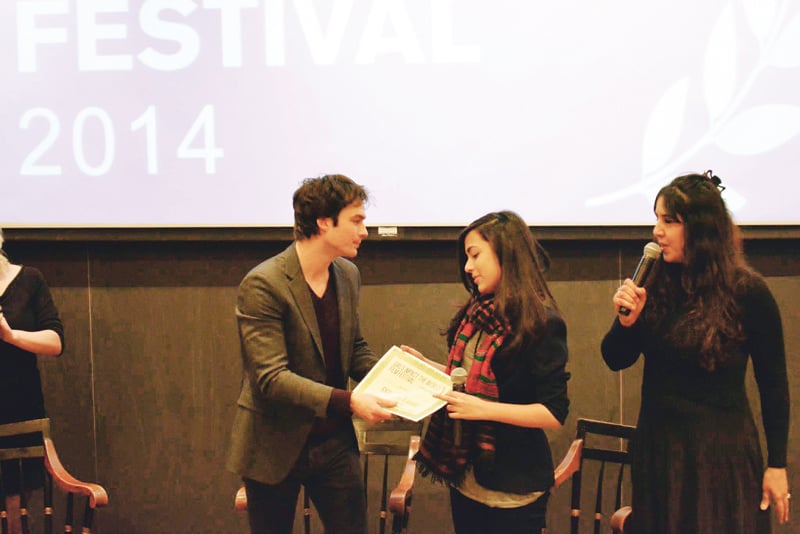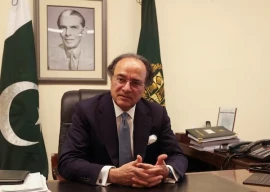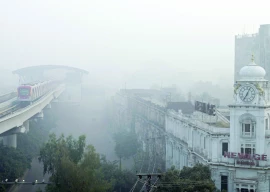
Sarah Jehaan Khan is an aspiring filmmaker, who came into the limelight after bagging the second prize at an international film festival at Harvard University last year. The 16-year-old is also among five Pakistani women featured in BBC’s 2014 list of 100 Women. Khan, who recently released her second film The Ripple Effect, spoke to The Express Tribune about the process of filming in rural areas and the power of film to lend impetus to social change.

The Ripple Effect portrays how access to potable water has transformed the lives of rural women in the country. When seasonal patterns began to change and rain became scarce, these women adopted methods of conserving rainwater in Chakwal. Sarah said that not only do the girls featured in the film, such as Deeba, no longer have to make a back-breaking journey to fetch water every day, but they also have the freedom to pursue new opportunities. This has also paved the way for them to earn an income they can invest in their children’s future.
“They continue to inspire the next generation of girls to conserve resources and use innovative methods to tackle an issue that affects over two billion people every day,” stated Sarah. The young filmmaker received positive feedback for the film, which has nearly 400 shares on social media already. “It got positive reviews, especially because it shows rural Pakistani women and girls in such a positive light,” she explained. “It shows how they are using simple, innovative methods to prevent a global crisis and how they are taking the lead and telling other people to follow them.”

Sarah’s first film, Harvesting Hope, won a distinction at the Girls Impact The World Film Festival, where actor-philanthropist Ian Somerhalder was among the judges. PHOTOS: SARAH JEHAAN KHAN
As a student of O Levels, Sarah had Development Studies and Environment Management as her subjects last year. “I came across the book Silent Spring by Rachel Carson, which inspired me to make my first film (Harvesting Hope),” said Sarah, who profiled cotton-picking girls and women in Multan in the movie. Recalling her favourite quote from the book, she shared that man is part of nature and his war against nature is inevitably a war against himself.
Harvesting Hope underlines the hazards women cotton-pickers are exposed to in cotton fields due to excessive use of pesticides and virtually no protection. The film also highlights the effect of pesticides on the environment and the vital role played by women organic farmers in protecting the environment and health of their families.
Sarah said she was most interested in exploring the relationship between girls, women and the environment, and filmmaking was just the right means to do that. Both her films highlight issues rural women are faced with in their communities in Multan and Chakwal respectively. “I saw that women are so intimately connected to the environment in Pakistan, whether through picking cotton or fetching water from eight kilometres away,” she said, adding, “They are the most affected by environmental issues but also have the most knowledge on how to conserve resources.”
Harvesting Hope won a distinction at the Girls Impact The World Film Festival and scholarship programme. It was by following the tweets of Mohammad Yunus, an economist and one of Sarah’s inspirations, that she came to know about the festival. To her surprise, he also happened to be on the judges’ panel along with Ian Somerhalder, actor and founder of the Ian Somerhalder Foundation, which works for environmental protection.
Following the film’s release, Khan was invited to speak at a conference in Colombo by the Asian Development Bank. “It was an intimidating audience because [it was attended by] chief justices from all across Asia, professors and the president of Sri Lanka. A judge from the Lahore High Court came up to me after my presentation and said it had brought him to tears.”

Sarah’s first film, Harvesting Hope, won a distinction at the Girls Impact The World Film Festival, where actor-philanthropist Ian Somerhalder was among the judges. PHOTOS: SARAH KHAN
Later, she was invited at the Pailey Centre for Media in New York to talk about creative social change through storytelling. Sarah, who is the daughter of activist and documentary filmmaker Samar Minallah, said her mother has been a major inspiration for her. “I’ve grown up in this environment, so it never seemed unattainable to me,” said Sarah, who will share her experiences as an alumnus of the programme at Harvard University next month.
Published in The Express Tribune, February 11th, 2015.
Like Life & Style on Facebook, follow @ETLifeandStyle on Twitter for the latest in fashion, gossip and entertainment.
1731325890-0/trump-(24)1731325890-0-405x300.webp)


1720507435-0/BeFunky-collage-(26)1720507435-0-165x106.webp)




1724926799-0/Untitled-design-(7)1724926799-0-270x192.webp)
1731829534-0/Copy-of-Untitled-(9)1731829534-0-270x192.webp)







COMMENTS (7)
Comments are moderated and generally will be posted if they are on-topic and not abusive.
For more information, please see our Comments FAQ